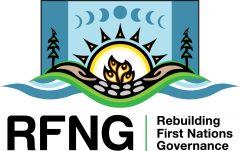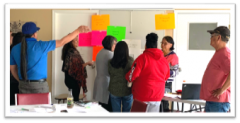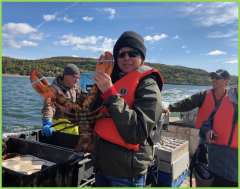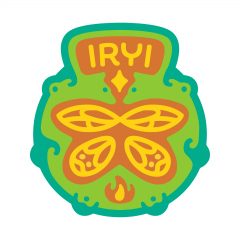RFNG Summer 2022 Update

PROJECT UPDATE
August 2022
Volume 1 No. 2
Community work
As the summer of 2022 comes to a close, the Rebuilding First Nations (RFNG) project team hopes you’ve had time to relax, recuperate from the stresses of the last two years, and to enjoy the close company of family and friends.
With more people immunized and Covid restrictions relaxed, we were very happy to be welcomed back into several of our partner communities as they were finally able to refocus on the important work of self-government. Our key partner, the Centre for First Nations Governance, (CFNG) has been especially busy working with Upper Nicola Band (UNB) in British Columbia in the past six months. They have an ambitious agenda of lawmaking and other activities to reclaim and restore their jurisdiction over family services, land and resources and cultural heritage as well as make improvements in local service delivery including housing.

UNB political and administrative leaders along with some community members also dedicated two days over April and July building their policy capacity. The workshop offered jointly by CFNG and RFNG with help from the Institute for Public Administration of Canada, takes senior staff and leaders through the basics of policy and policy making in general; helps people recognize how good policy management contributes to good governance practices, underpins The Five Pillars of Effective Governance, and builds First Nation capacity for law-making under the inherent right to self-government. It also builds understanding about how other orders of government in Canada use and manage policy, particularly in relation to First Nations.
Lawmaking for Nation Rebuilding

As part of our ongoing support to UNB, the CFNG and our project coordinated a national, virtual think tank on Lawmaking for Nation Rebuilding on May 10th. In addition to UNB participants gathered on their traditional territory, dozens of participants from across the country observed the session, including from Lil’wat, T’it’q’et and Cowessess First Nations, the Likhsilyu Clan of the We’tsuwet’en Nation, File Hills Qu’Appelle Tribal Council, and Nishnawbe Aski Nation. The think tank covered lessons-learned and discussion with the leadership of Nipissing and Listuguj First Nations, both of whom have long experience in reclaiming their legal jurisdictions over fisheries among other areas of self-government. Canadian and Indigenous law experts Kent McNeil and Naiomi Metallic provided participants with an encouraging view on the current Canadian legal context for exercising the inherent of self-government.
You can read more about the think tank, including summary findings from each of the three presentations, here.
This Fall! Storytelling Events for Inherent Rights Youth Initiative
First Nations Youth across Canada are warmly invited to take part in the Inherent Rights Youth Initiative (IRYI) starting in September. IRYI is a joint project led by the Centre for First Nations Governance, to accelerate nation rebuilding by investing in young people and providing opportunities to develop their leadership capabilities.
Following a successful series of events in 2021 (watch the brief video about it here) this year’s initiative will be focused on creating a new memory in the minds of our children and youth. Youth will envision the new stories that First Nations children and youth will tell with the resurgence of traditional governance systems, practices and inherent rights leadership. Building on traditional stories from Elders across the country, this year’s Inherent Rights Youth Initiative will support a diverse group of First Nations youth from across Turtle Island in an online learning space, by virtually visiting five of our partner communities (Star Blanket Cree Nation, Nishnawbe Aski Nation, Lil’wat Nation, Listuguj Nation, Upper Nicola) as they share stories with us on the CFNG’s five pillars of effective governance.

This initiative helps youth explore cultural identity and enables them to ground their understanding of the inherent right to self-government through language, art, history, and the land. IRYI is about advancing good governance, language, culture and effective leadership. It is about reclaiming what inherently belongs to the youth and bringing together Youth and Elders to develop a new generation of inherent rights leaders.
The storytelling events will be held virtually every three weeks starting in mid-September and capped with a one-day virtual Elder & Youth gathering in December. If you are an interested First Nations youth or would like the youth leaders in your community to benefit from this development experience, contact Amsey Maracle at amseymaracle@cunet.carleton.ca or register at: https://form.jotform.com/222295790835162.
Research
Three foundational research projects are underway. Stephen Cornell, Miriam Jorgensen, and research assistant Grace Dupasquier are preparing a study of Native American approaches to revivifying Indigenous governance practices. First stage work, now underway, is based on published sources, but in the next phase they hope to focus on a few case studies. On the matter of financing Indigenous self-government, Emmanuel Brunet-Jailly and Mason Ducharme have nearly finished a survey of various polities’ approaches to this important function. They have already published an op ed in the Victoria Times Colonist arguing that a portion of property tax should go to Indigenous governments. Federal approaches to financing First Nations are being studied by Frances Abele.
Don’t forget to check our website regularly for new articles, publications and resources about self-government. We have a host of top self-government experts featured in a variety of videos from previous conferences and we often feature the work of some of our individual collaborators.
One article we’ve been reading and re-reading is Five Linguistic Methods for Revitalizing Indigenous Laws McGill Law Journal, Forthcoming Naiomi Metallic, RFNG collaborator, Assistant Professor of Law, and Chancellor’s Chair in Aboriginal Law and Policy at Dalhousie University provides a personal and inspiring look at how Indigenous languages can inform the development and implementation of Indigenous legal orders. Reflecting on her own personal journey to learn her Mìgmaq language, combined with her expertise as a legal scholar, she argues in this draft article there are many ways even non-speakers can “unlock the treasures to be found in Indigenous languages.”
How Indigenous Nations have been transforming public policy through the courts
Project co-directors Frances Abele and Satsan (Herb George) along with partner Kent McNeil celebrated their new book chapter in June with the publication of Policy Success in Canada: Cases, Lessons, Challenges (E. Lindquist, M. Howlett, G. Skogstad, G. Tellier, P. ‘t Hart. eds. Oxford University Press, 2022).
Chapter 20, “How Indigenous Nations have been transforming public policy through the courts” traces the evolution of court decisions based on Indigenous legal challenges, and their impact on government policy responses. Abele, George and McNeil conclude that Indigenous peoples have been remarkably successful in achieving some of their legal and political goals through court action. “Supreme Court decisions have forced governments to revise their policies regarding land rights, access to natural resources, treaty rights, involvement of Indigenous peoples in decision-making through consultation, and so on”.
You can download the entire book for free.
Honours for one of our own
We are very proud of the high calibre of expertise and experience of all RFNG partners and collaborators. Working with such accomplished thinkers and doers makes every day a pleasure. And some days are extra special when these individuals are recognized in their communities for the work they do. This June we were all very happy to see the announcement that RFNG co-director and Carleton university professor Frances Abele is receiving the Order of Canada. One of Canada’s top honours awarded by the Governor General, Frances is being recognized for her outstanding contributions to public policy, in particular for her research in Indigenous and Northern issues. Read more about the honour and Frances’ role in RFNG.
Follow us on Twitter @fn_gov and Linked In
Or email rfng@carleton.ca